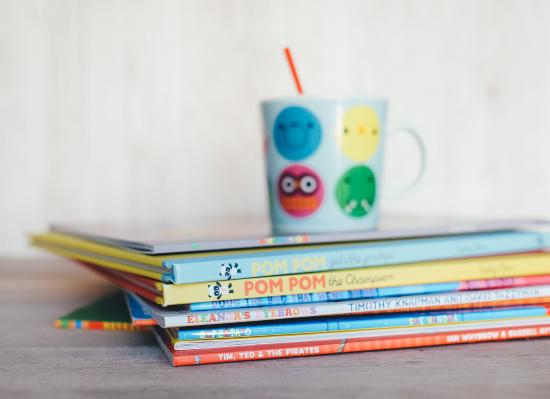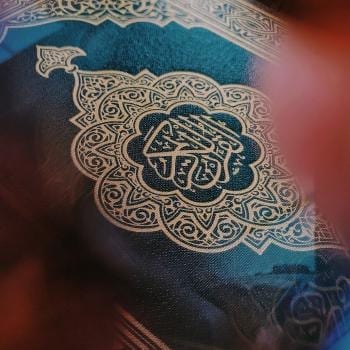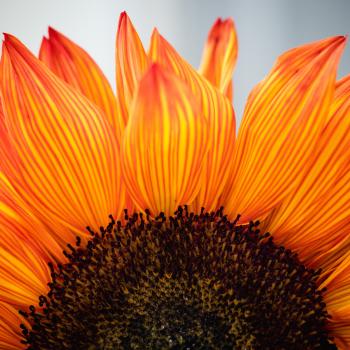
She’s 40 minutes late. I keep clicking at my phone, hoping that looking at the time will help.
“Hamza, get back here!” I quietly yell as he wallows his way back to me. “Do not go down the hallway or we will go back in the car. Do you want to go back in the car?” I ask with an empty threat. He nods his head in the negative.
“Ahmed, it’s not nice to peek in the door while the teacher is talking to another student. Stop it,” I tell the other one. I can’t stand anymore, but I have to. I feel the gnawing pain in my abdomen and a sharp needle-like stab.
“Ahmed, please come here,” I plead. “Stop looking into your teacher’s room. Our turn is coming next.” He dawdles over toward me and joins me in bracing his back against the wall. I look down at my phone. Another stab. My eyes wince. The gnawing is getting worse, but I know how to hide it well.
“Mommy,” Ahmed asks, “can we go to the book fair?”
I look at him with angered bewilderment, as if he should know better. “No,” I shoot out quickly, as if he should understand what I’m feeling. The other kindergarten teacher opens her door and greets Ahmed, but doesn’t get a response back.
“Aren’t you going to say ‘hi’?” I demand. He responds. She takes out two chairs and asks if I would like to have a seat. Yeah right, I wish. “No, I’m good, thanks.” My children jump at the opportunity for a distraction and take the seats.
“Would you two like to have a seat?” I say sarcastically. I wish I had brought my cushion from the car; maybe I could have sat down for a while. Forget it, I think. Just more things to hold. The pain is getting worse and the stabbing is consistent. Hurry up, lady.
The door opens. Yes! Alhamdulillah. Our turn! She looks at the schedule on the door nonchalantly and says, “Not bad, almost on time.” She welcomes us in and my kids immediately magnetize towards the toys. My game-plan: stand, don’t sit. You don’t have your cushion; you will pay for it dearly later. Stand, don’t sit, I keep telling myself as I follow the teacher toward her desk. She sits. I sit. Crap. The stabbing intensifies and the gnawing pain in my abdomen radiates into my back. Why am I so stupid?
As the teacher shows me Ahmed’s work and progress through the first quarter, Hamza is screaming over a toy Ahmed won’t share. I turn to Ahmed, say his name with a slight scold, and give him “the look.” He promptly gives Hamza the toy. The one who screams loudest always wins.
“Sorry,” I apologize, “so these are his journal entries?” He’s doing very well, she explains, but she would like him to gain more independence. She assists him with topics and sounding out words, but knows he can do it by himself.
“OK. I’ll be sure to make changes at home when we do homework and practice.” I squiggle around in my chair, adjust my position and posture, hoping it may help, but to no avail. I keep looking through Ahmed’s journal entries while she tells me the respective topics. I flip through a blank page.
“Oh, what happened with this one?” I ask, almost amused.
“Oh, that one was about your favorite vacation or holiday and he seemed to just go blank,” she explained. “He didn’t know what to write about and I told him to even write about your favorite place to eat, but he just ended up drawing.”
Ouch. No, this was a different pain. These words were a stab to my heart, and it hurt the most. My pain never brings me to tears. Tonight, I was struggling to hold them back. I forgot I was sitting. My hijab suddenly became too tight with that stubborn rock in my throat. My face became hot. Stop it. Stop it. Focus. Say ‘Alhamdulillah’ for everything.
Alhamdulillah, I say to myself, and try to get back to our conference.
I sign some papers, take some of Ahmed’s work and stuff it into my purse, and tell the boys we are going now. “Alright, whatever mess you both made, clean it up and let’s go,” I command. “We’re going now.” They rush to clean up and we head out the teacher’s door. As we are walking, me almost limping at this point, I look at Ahmed with remorse and ask him, “Do you want to go to the book fair?”
Two years ago, when my pain started, my husband tried to have a heart-to-heart with me. I’m not very emotional and I pride myself on being tough. He told me that I will get through this, and not to give up. I looked at him in a way that asked, Why are you patronizing me? I told him in a stern and almost amused voice, “I’m fine. I’ll be fine.”
He told me, “I know you are now. And you will be for a while. This just started and at the start, you feel strong, unbeatable. But as time goes on, days will become weeks, weeks will become months, and you’ll still have this pain. Your pain won’t ever be what gets to you. It won’t break you or make you cry. When months go by it will be the mental exhaustion that will get to you, and when that happens, I’ll be here for you.”
I have broken down many times since then. To him, to myself, to Allah. I thought it was weak of me to show my weakness, but it always made me stronger, and made us stronger. Pride is a dangerous thing, and I have lots of it. This condition has broken that pride down and has been the most horrifically humbling experience, and continues to be.
When my son asks me, “Mommy can we bake these cookies?,” because why not? I used to bake all the time. When I have to answer him, “No, baby, I can’t,” instead of just a stern, “No,” my pride chips away. When he asks me, “Mommy are you better now?” and I have to tell him, “Not yet, but soon Inshallah,” it chips away. When I have to be helped into bed, it chips away.
Mothers are generally hard on themselves when it comes to the well-being of their family, especially children. I live every day battling the feeling that I’m failing them because I can’t give them what a healthy, “normal” mother could; I can’t give them what I once could. Every day my pain reminds me of what I can’t do, and what I can’t do for them. “You’re a wonderful mom,” my husband reminds me. I need those reminders. After all, what is it to be a “good” mother, or a “good” anything? Is there a mold or an equation fabricated that prescribes the characteristics and actions of an individual to be considered “good”? Or is being a “good” anything really just demanding the best a person can do in any individual context? Even when the best isn’t enough, and there may be such cases, one can never be stripped of their effort and heart’s truest aspirations.
Want your voice to be heard? Send your submission to [email protected]! Visit the “Contribute to MM” page for more details.
Follow Mostly Muslim on Facebook HERE.












